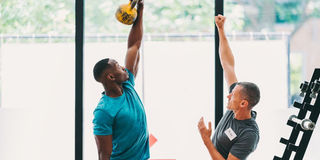Beginner shoulder exercises you can do at home

There’s more to gaining bigger shoulders than a volume-focused lifting programme. PHOTO | FILE
What you need to know:
- Shoulder training has several benefits beyond the aesthetic; it enhances posture and strengthens the muscles surrounding the shoulder joint, creating more stability and an overall sturdier body structure.
There are various ways to do exercises targeting your shoulders at home. These exercises will involve dumbbells which you can purchase online at between Shs 38,000 for two kilogramme dumbbells and Shs132,000 for a 12 kilogramme dumbbell set. Here are three types of beginner exercises you can do at home to strengthen your shoulders:
Lateral raises (three sets of eight to 10 reps)
According to Laura Williams, a certified fitness and exercise physiologist, nutrition specialist and author of Partner Workouts, you will need dumbbells and enough space where your arms can raise to the ‘T’ position without obstruction. Once you are in this space, stand straight with your dumbbells in each hand, and your arms at your sides. In this position, your palms should be facing inside. Position your feet at roughly hip-distance apart.
“Raise your arms at the same time, slightly then pause to ensure you disengage your trapezius muscle from the movement, and you target the deltoids as intended,” she says.
“Lift the dumbbells up and out to each side, keeping your arms almost completely straight, stopping when your elbows reach shoulder-height and your body is forming a ‘T’ shape. Breathe in as you lift.”
Once at the top, pause and hold for a second for every movement. Then lower the dumbbells slowly.
“Breathe out as you lower your dumbbells and take about twice as long to lower the weights as you took to lift them,” says Laura.
As days go by, you can also do this exercise while seated. According to BodyBuilding (a physical fitness platform), when doing this exercise while seated, you will not have the ability to cheat the weight of the dumbbells by using your legs. At the same time, the weights will be able to go slightly underneath the bench you will be sitting on instead of going in front of you as they do when standing. This will give you improved motion.
Standing shoulder press (three sets of six to eight reps)
Hold a pair of dumbbells with your elbows pulled into your ribs and your arm palms facing each other. Hold this position as long as you can to build a base of strength. Then drive the dumbbells up to the top position with your hands over your shoulders and your biceps next to your ears.
Focus on stabilising your body in this locked out position. Once you have mastered from the start to the end, you can safely add more weight to this exercise. Your muscle growth should correspond with the right weights.
Dumbbell upright rows (two sets of eight to10 reps)
According BodyBuilding, be careful about how much weight you can manage with this exercise. For instance, taking on too much weight can lead to shoulder injuries.
Also, you should not do this exercise if you suffer from shoulder injuries. According to BodyBuilding physical trainer Hildebrandt, start by holding each dumbbell in each hand, with your palms forward.
The dumbbells should rest on top of your thighs. Your arms should be extended with a slight bend at the elbows, and your back should be straight. When in position, use your side shoulders to lift the dumbbells as you exhale. The dumbbells should be close to your body as you move it up.
Your elbows should drive this motion. This means your elbows should always be higher than your forearms. Continue to lift them until they nearly touch your chin. When doing this exercise, you should keep your torso stationary and pause for a second at the top of the movement. Then lower the dumbbells back down slowly to the starting position. Inhale and repeat the routine.
Dumbbell front raise (four sets of 12 reps)
This type of exercise will be effective in isolating the anterior deltoid muscles (the front of your shoulder). To do this exercise, stand upright and hold the dumbbells in front of you. Your palms should face your legs.
“Keep your elbows and knees slightly bent as you raise your arms straight in front of you to shoulder level. Slowly return to the starting position,” says Laura.
At the beginning, you will need to move up and down; two seconds up, two seconds down. When doing this, you should not lock out your elbows or lean back. As your body becomes accustomed, you may then increase your rests to 30 seconds. Once you perfect this exercise, you may start to combine it with your lateral exercises.
READ MORE: Limited time? Consider mini workouts





